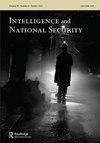一个微妙的真相:约翰·勒·卡罗,间谍小说和情报
IF 0.8
3区 社会学
Q1 HISTORY
引用次数: 1
摘要
本文介绍了约翰·勒·卡罗莱的著作对研究情报和国际事务的重要性。我们将介绍贯穿本期的三个主题。首先,这个问题促成了关于如何在情报和安全研究中研究文化文物的方法论辩论。其次,作者讨论了智能的表现形式,并强调了事实与虚构之间的模糊界限。第三,贡献强调了勒·卡罗莱尔作品的普遍性。我们认为,小说是一条重要的研究路线,因为它是情报活动中最广泛共享的话语之一。本文章由计算机程序翻译,如有差异,请以英文原文为准。
A delicate truth: John le Carré, spy fiction and intelligence
ABSTRACT This article introduces the importance of John le Carré’s work as a lens to study intelligence and international affairs. We introduce three themes that are developed throughout this issue. First, this issue contributes to methodological debates about how to study cultural artefacts in intelligence and security studies. Second, authors discuss representations of intelligence and underline the porous boundaries between fact and fiction. Third, contributions emphasize the universal character of le Carré’s oeuvre. We argue that fiction is an important line of enquiry since it is one of the most widely shared discourses on intelligence activities.
求助全文
通过发布文献求助,成功后即可免费获取论文全文。
去求助
来源期刊

Intelligence and National Security
Multiple-
CiteScore
1.80
自引率
41.70%
发文量
93
期刊介绍:
Intelligence has never played a more prominent role in international politics than it does now in the early years of the twenty-first century. National intelligence services are larger than ever, and they are more transparent in their activities in the policy making of democratic nations. Intelligence and National Security is widely regarded as the world''s leading scholarly journal focused on the role of intelligence and secretive agencies in international relations. It examines this aspect of national security from a variety of perspectives and academic disciplines, with insightful articles research and written by leading experts based around the globe. Among the topics covered in the journal are: • the historical development of intelligence agencies • representations of intelligence in popular culture • public understandings and expectations related to intelligence • intelligence and ethics • intelligence collection and analysis • covert action and counterintelligence • privacy and intelligence accountability • the outsourcing of intelligence operations • the role of politics in intelligence activities • international intelligence cooperation and burden-sharing • the relationships among intelligence agencies, military organizations, and civilian policy departments. Authors for Intelligence and National Security come from a range of disciplines, including international affairs, history, sociology, political science, law, anthropology, philosophy, medicine, statistics, psychology, bio-sciences, and mathematics. These perspectives are regularly augmented by research submitted from current and former intelligence practitioners in several different nations. Each issue features a rich menu of articles about the uses (and occasional misuses) of intelligence, supplemented from time to time with special forums on current intelligence issues and interviews with leading intelligence officials.
 求助内容:
求助内容: 应助结果提醒方式:
应助结果提醒方式:


